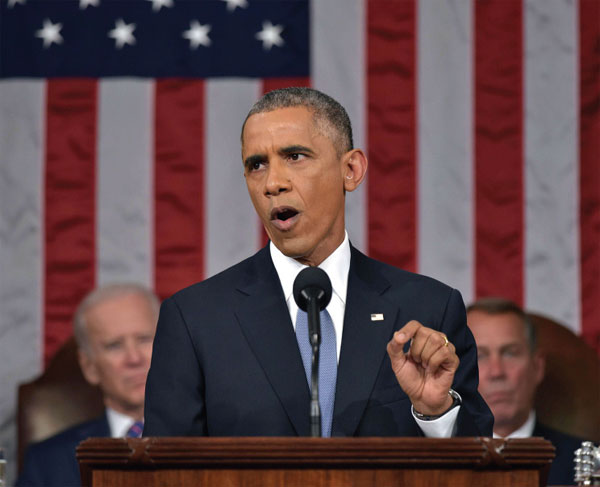Obama seeks backing of force vs. ISIS
|
US President Barack Obama delivers his State of the Union address to a joint session of Congress on Capitol Hill in Washington on Tuesday. Reuters |
Despite standing for the first time in front of Congress with both chambers controlled by Republicans, US President Barack Obama spoke with great optimism in his sixth State of the Union address on Tuesday night.
Mentioning the two prolonged and costly wars in Afghanistan and Iraq and the financial crisis, Obama claimed "but tonight, we turn the page."
The US president said "the State of the Union is strong."
"At this moment - with a growing economy, shrinking deficits, bustling industry and booming energy production - we have risen from recession freer to write our own future than any other nation on Earth. It's now up to us to choose who we want to be over the next 15 years, and for decades to come," Obama said.
Obama outlined his vision for "middle-class economics" and pledged to "restore the link between hard work and growing opportunity for every American."
Obama promised to veto any congressional proposals that would undermine his major legislative achievements to date.
He has proposed tax increases on the wealthy that would help finance tax breaks for middle-income Americans, a move that has drawn sharp opposition from the Republicans. Obama also has pushed for more paid sick leave and a free community education.
He asked Congress to formally authorize the use of force against the Middle Eastern terror group ISIS.
Obama said he will veto any additional sanctions on Iran as the administration seeks to finalize a nuclear deal with the country.
"There are no guarantees that negotiations will succeed, and I keep all options on the table to prevent a nuclear Iran," he said.
"But new sanctions passed by this Congress, at this moment in time, will all but guarantee that diplomacy fails - alienating America from its allies and ensuring that Iran starts up its nuclear program again. It doesn't make sense."
Obama also defended his recent decision to normalize diplomatic relations with Cuba. "Our shift in Cuba policy has the potential to end a legacy of mistrust in our hemisphere; removes a phony excuse for restrictions in Cuba," he said.
"And this year, Congress should begin the work of ending the embargo," he said.
Like in previous State of the Union addresses, Obama singled out China several times.
Speaking about boosting US exports, Obama said that China wants to write the rules for the world's fastest-growing region. "That would put our workers and businesses at a disadvantage. Why would we let that happen? We should write those rules. We should level the playing field," Obama said.
"That's why I'm asking both parties to give me trade promotion authority to protect American workers, with strong new trade deals from Asia to Europe that aren't just free, but fair."
Jon Taylor, a professor of political science at the University of St Thomas, said it "sounds full of hubris (some would say hegemonic) and protectionist to me."
The Obama administration has long called for the Republican-controlled Congress to grant it Trade Promotion Authority (TPA) so it can negotiate more confidently and effectively with 11 other members of the Trans-Pacific Partnership (TPP).
Negotiations between the US and Japan in TPP have hit a snag over the opening of agricultural and automobile market.
Obama called for bringing more manufacturing jobs back to the US and said that "more than half of manufacturing executives have said they're actively looking at bringing jobs back from China." However, he did not give source for that number.
A US-China Business Council survey of its members last year showed that an overwhelming majority of US businesses are profitable in China and plan to expand their businesses in the world's most populous country.
US Trade Representative Michael Froman last month touted the benefits of trade with China by saying that the US exports to China have grown by more than 50 times since 1983 and bilateral investment has also skyrocketed. r.
Obama vowed to strengthen cyber security and combat terrorism. He said the US is modernizing its alliances in the Asia Pacific region while making sure that other nations play by the rules - in how they trade, how they resolve maritime disputes, and how they participate in meeting common international challenges like nonproliferation and disaster relief.
"And no challenge - no challenge - poses a greater threat to future generations than climate change," said Obama, in front of a Congress abundant of climate change deniers.
Obama praised his landmark climate deal concluded with Chinese President Xi Jinping during his trip to China last November.
"In Beijing, we made a historic announcement - the United States will double the pace at which we cut carbon pollution, and China committed, for the first time, to limiting their emissions," Obama said.
In that announcement, the US has promised to cut net greenhouse gas emissions by 26 to 28 percent below 2005 levels by 2025. Meanwhile, China announced targets to peak CO2 emissions around 2030, with the intention to try to peak early, and to increase the non-fossil fuel share of all energy to around 20 percent by 2030.
Taylor said Obama's State of the Union address in 2014 had only two mentions of China, both emphasizing it as a competitor.
"This year he managed to mention China three times. I would not categorize that as progress," Taylor said.
"China is mentioned negatively twice on trade and positively once on climate change," he said.
"While rarely mentioning China in his address, Obama definitely had China on his mind with issues such as economics, cybersecurity, climate change and trade. The tone reflected American wariness about China's prominence on the world stage," Taylor said.

























